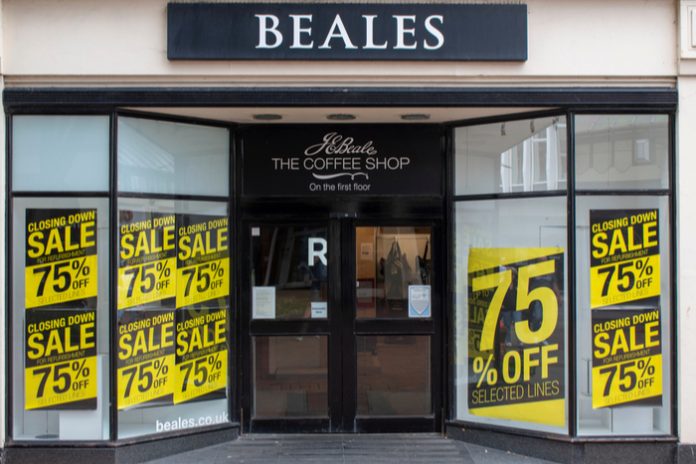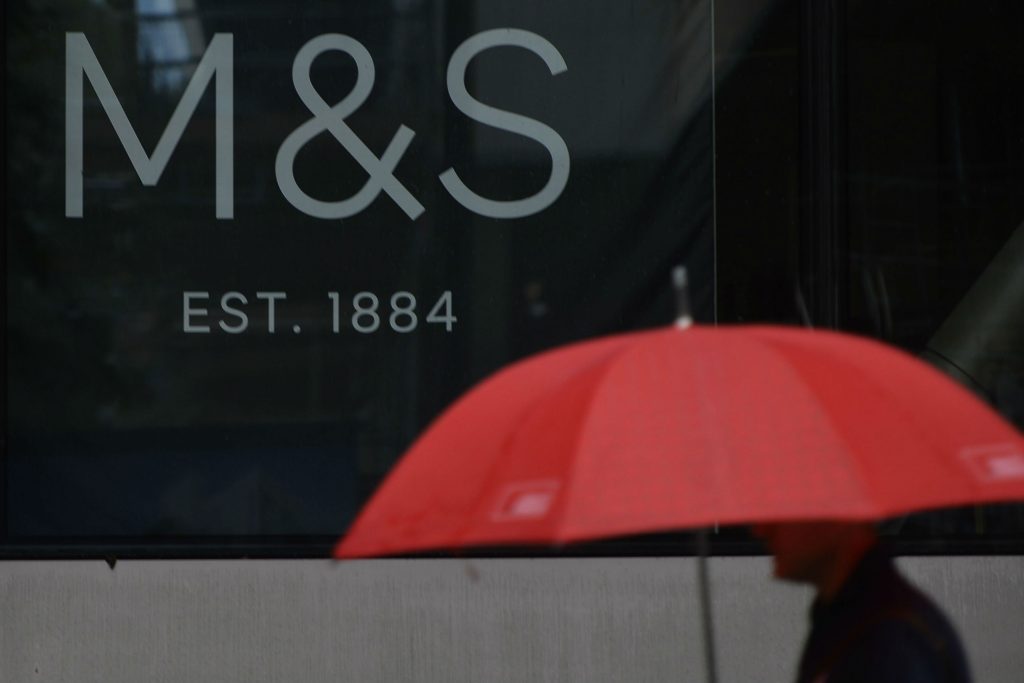A BRIEF TIMELINE
1881: John Elmes Beale founded his department store – initially known as Fancy Fair and Oriental House – in Old Christchurch Road in Bournemouth, Dorset. The store started off by selling products and novelties that reflected the growing enthusiasm for Chinese and Japanese culture.
1884: The shop produced the first of its special resort souvenirs, including an album of views of the town.
1885: Beale came up with the idea of having a live Father Christmas parading in the shop and showrooms – possibly the first instance of this being done in world.
1943: The Luftwaffe raid of World War II, which claimed more than 70 lives, also destroyed Beales’ Bournemouth branch.
1950: The Bournemouth store was rebuilt by local construction company Drewitt. Frank Beale (FB) also succeeds as chairman of the family-owned business. Beales was run by the family of the same name for much of the the 20th century.
READ MORE:
- 1300 jobs at risk as Beales collapses into administration
- Beales paying £1m more in business rates than it should be
1969: Beales began expanding. It opened a sister store called Bealesons in Poole’s new Arndale Centre.
1982: With the UK in recession, Beales announced that Bealesons would shut down.
1987: Frank Beale stepped down as chairman, to be replaced by Nigel Beale – grandson of founder John Elmes Beale.
1995: Beales is floated on the London Stock Exchange.
1996: Whitakers, the Bolton department store opened in 1829, was bought by Beales.
2002: The group acquired the Bentalls department stores in Ealing, Tonbridge and Worthing from Fenwick.
2004: Beales announced a “major drop in profits” in Bournemouth, blaming the opening of Castlepoint shopping centre.
2006: Beales opened in Horsham in premises formerly occupied by Allders.
2010: Beales spent £250,000 to acquire the Robbs department store out of administration from Vergo Retail. The store is in Hexham.
Beales also acquired the Westgate department store in Rochdale from the Anglia Regional Co-operative Society.
2011: Beales acquired 19 additional Westgate stores. The Whitakers store changes its name to Beales.
2012: Beales opened an outlet store in the former TJ Hughes premises in The Mall Maidstone. Meanwhile Beales’ Skipton store closed.
2013: Beales revealed a loss of almost £6 million and refinanced its debts. Its new outlet store in The Mall Maidstone closes down. A store in Cinderford also closed.
2015: Beales is delisted from the stock market after being public for two decades, after investor Andrew Perloff bought the retailer for just £1.2 million.

2016: Beales won creditors’ backing for a CVA, enabling it to negotiate rent cuts and close unprofitable stores.
2017: Beales’ non executive director Anthony (Tony) Brown appointed chief executive.
October 2018: A management buyout scheme led to Brown acquiring 97 per cent of the shares in Beales, with the backing of a private equity group.
November 2018: Beales acquires indepednet department store Palmers, which has two sites in Great Yarmouth and Lowestoft in East Anglia. The deal ended Palmer’s 180 years of family ownership.
January 2019: Beales is operating 23 stores around the UK, mostly in regional cities and towns. In its Christmas trading update for the four-week period ending January 1, it recorded a three per cent uptick in sales – which Brown hailed as a “credible performance”.
The results also followed somewhat dismal summer for Beales, and individual trading performances for their stores varied during the festive period. For example, its Bournemouth flagship suffered from roadworks disruption and was one of Beales’ worst-performing stores.
October 2019: Beales reported a loss of £3 million
December 2019: Beales put itself up for sale as it looked at refinancing options amid tough retail conditions taking their toll on the 138-year-old department store chain. Beales said it had launched a formal strategic and financial review being led by KPMG, with options including a sale of the business as well as refinancing.
Beales said it “continues to acclimatise to the ever-changing landscape and challenges of the retail market”. It also said it was looking for investment to “deliver a sustainable business model for the future”, including cost-saving measures and a refocus on homewares, small domestic appliances, fashion accessories and shoes.
January 13: Beales filed a notice of its intention to appoint administrators, as it continued to mull its future prospects amid the strategic business review led by KPMG.
January 15: Property consultancy firm Colliers International found that Beales was paying over £1 million more than it owes in business rates.It said Beales’ 22 stores were paying a total of £2.85 million in business rates this year. Colliers said this was more than it should be. Adding up four years of overpayment since the last business rates revaluation, Colliers estimated that Beales paid £1.06 million more in business rates than it should have.
January 20: Beales officially falls into administration after failing to secure a sale to a new owner. KPMG were appointed as administrators following a board meeting.
KPMG said Beales’ 22 stores would operate as per usual as it carries out the administration process. All 1300 staff have not yet been impacted as there are no immediate store closures confirmed. However, Beales’ website was taken down.
THE REASONS
Beales’ administration comes as department stores in particular suffered the hardest from the downturn and challenges that plagued the UK retail industry in recent years.
House of Fraser fell into administration in mid-2018, before it was snapped up by Mike Ashley’s Frasers Group – then known as Sports Direct International.
Last year, Ashley described how the House of Fraser’s finances were “nothing short of terminal in nature”.
“Department stores are facing one of their most challenging periods in a long time”
Debenhams also fell into administration last year and was rescued by its lenders who launched a CVA shortly after.
The CVA has so far led to 19 Debenhams stores closing this month, with more planned in the future.
John Lewis suffered a tough Christmas too, with its parent company warning that the annual staff bonus might be scrapped this year.
Managing director Paula Nickolds also exited the department store amid its Christmas trading update.
Another high-profile collapse was BHS, which left 11,000 staff out of work in 2016 and grabbed headlines when the retailer’s pension fund was found to have a massive £571 million deficit.
In the case of Beales, chief executive Tony Brown accused councils of failing to help struggling retailers, saying that local authorities “really don’t care” about high street stores.
Speaking to the BBC last week, he said: “We’ve only managed to get one council to help us out on a temporary basis.
“It’s unlikely that Beales can bounce back from this”
“Councils really don’t care, because they get their business rates whether we’re there or not, because the landlord pays if the store closes.”
Following the administration, Will Wright, partner at KPMG and joint administrator said: “For over a hundred years, Beales has been a stalwart of the high street in market towns up and down the UK, but like countless similar retailers, has found trading in recent times to be incredibly tough.”
Brian Burke, director at business advisory firm Quantuma, said Beales’ trading performance suffered throughout 2019, in line with many competitors.
“This, coupled with a disappointing Christmas trading period and failure to secure cost reductions including rents and business rates plus their inability to secure new investment, is what ultimately has resulted in administration.”
In 2016, the year BHS collapsed, Beales won creditors’ backing for a CVA, enabling it to negotiate rent cuts and close unprofitable stores.
While this was successfully implemented, subsequent trading periods have seen the department store chain register losses. It came to a head in October 2019, when a £3 million loss was reported.
“For over a hundred years, Beales has been a stalwart of the high street”
Rick Smith, managing director of Forbes Burton, said Beales’ downfall is due to its lack of innovation.
“Department stores are undoubtedly facing one of their most challenging periods in a long time,” he said.
“Shopping trends are changing and department stores are struggling to diversify and adapt their offerings.”
He maintained that high rents, business rates and poor Christmas trading all pushed Beales over the edge, and the failure to find a stable footing online didn’t help either.
“The most successful stores, Next for example, do so well because of the way that they use online sales to bolster sales in their physical stores,” Smith explained.
“It’s unlikely that Beales can bounce back from this. They don’t have as many stores as the other larger departments stores such as Debenhams and House of Fraser, and they definitely don’t have as much brand recognition.”
Rob Coke, co-founder and client director at Studio Output, agreed. He said the best department stores provide an element of luxury and a sense of status – but this required being easily recognised.
“Beales’ main challenge is that unless you live near one, you’ve probably never heard of it. The name just doesn’t have the cache of its more well-known competitors,” he said.

Coke added that department stores can no longer rely on the convenience of having everything in one place thanks to the growth in online shopping.
Laura Morroll, senior manager at BearingPoint, told Retail Gazette that the convenience of online shopping was the reason why department stores were having to work extra hard.
“The challenge is for department stores to create a meeting point and an enjoyable environment that people want to visit,” she explained.
“All too often we see that it is a downward spiral of falling profits and lack of investment in the physical store environment resulting in them looking tired and undesirable.”
Without a doubt, Beales has faced similar challenges as other mid-market department stores – despite the fact it has a smaller share of the market.
While Debenhams, John Lewis and House of Fraser all have locations in all major cities and urban hubs in the UK, Beales’ stores are mostly located in towns and secondary cities.
Beales also faced the perfect storm of structural market change as spend shifted online, increased retail competition amidst dwindling consumer confidence and footfall, and soaring costs on everything from utility bills, minimum wage rises, rent and property taxes.
Without a unique customer proposition and a catchment that relies on less-populated areas, the survival of the Beales name in these conditions is fraught with uncertainty.
Click here to sign up to Retail Gazette’s free daily email newsletter


















